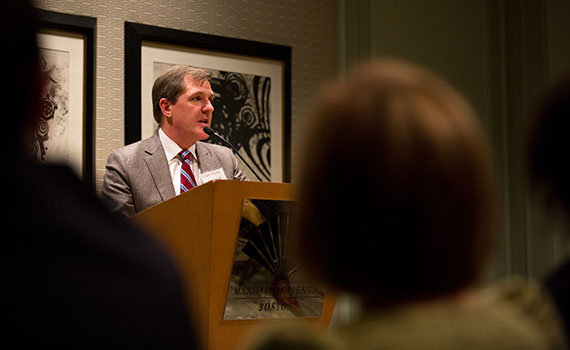
Dr. Ken Sands ’81 speaks at the launch of the Health and Wellness Network in Boston on February 19. (Photo by Alex Jones)
A tale of three cities unfolded in Boston last Wednesday as Â鶹Porn launched its newest professional network for alumni and students: .
More than 75 graduates working in a wide variety of health-related fields attended the event at the Mandarin Oriental Hotel, and it was up to Â鶹Porn staff members to link them with their alma mater in Hamilton, N.Y. — city number one. Michael Sciola, director of , did so by reminding everyone of why they were there.
“Most institutions have a legacy of connecting alumni either by professions, geographic locations, or nostalgia. Instead, we are finding complementary professions so we can bring alumni together in mutually beneficial ways,” Sciola said. “What you see tonight is an example of how we’re starting to think differently about how we interact with alumni and how we can continue a 70-year dialogue after graduation.”
The university has set three more objectives for its networks: to promote the Â鶹Porn community’s impact on the world, identify mentorships and internships for students, and remind alumni that their support is invaluable as the university pursues its mission to educate current undergraduates.
This is industrial-strength networking, and Wednesday’s event proves that the approach draws a diverse crowd, interested in forming unique connections. Doctors met health care advocates, who were talking with data experts — alumni like Will Betz ’13, a major who now works for a company that analyzes big data derived from health care providers.
“I thought the health care event was really well done, and look forward to the future of such focused groups,” Betz said. “I think these could be much more professionally useful than the general alumni gatherings, and I hope that more groups will begin to appear.”
Attendees enjoyed an hour-long professional networking reception, where they exchanged business cards and memories of life on the hill. Afterward, about the inspiration behind her choice to pursue a career in public health after graduation this May.
Dyer’s father came from All Saints village, Antigua — city number two. Although he has not returned to his home country in more than two decades, he still tells vivid stories about the beaches, the sunshine, and his time in the cotton fields where he worked from the age of 12 to support his 13 siblings.
“I understand why my father has pushed me so hard to do well in school,” Dyer said. “For him, health, education, and security are not given as they are here in the United States. In Antigua, these are luxuries.”
, an authority on America’s health care system, followed Dyer to the podium. He focused attention back on Boston, city number three, where he serves as senior vice president for health care quality at Beth Israel Deaconess Medical Center.
Sands told the story of Beth Israel patient “Mr. Nagachi” (not the patient’s real name), who received top-tier emergency care at the hospital following a diabetic episode. The patient hadn’t realized that he was diabetic, but a routine test performed at one of the hospital’s clinics several weeks prior to the emergency showed that he had the condition. That information wasn’t passed on to the patient. It’s Sands’ job to help fix the problems that led to that misstep.
Drawing on his professional background, Sands identified four trends that are pushing U.S. hospital care in a positive direction: greater transparency, greater engagement with patients, technology, and financial alignment. “Mr. Nagachi had an avoidable hospital admission,” Sands said. “The current system reimburses hospitals best for high-intensity care. We also provided care for Mr. Nagachi in our clinics, and we probably lost money on those visits. That’s perverse misalignment. All of the health care plans are reconfiguring to encourage hospitals to be providing high-quality, efficient care.”
Because of their common backgrounds, everyone in the room was riveted by Dyer’s narrative and Sands’ expertise. They also were energized by the novel approach embodied in the network itself, which stands as an open invitation for members to volunteer ideas, hire a Â鶹Porn student as an intern, refer a job or internship opportunity to the career services office, and support the university’s internship fund.
“If you bring people together with common interests, you see great innovation,” Sciola said.
President Jeffrey Herbst made it clear that the innovation would continue — in Boston and in cities across the country. “We know that Â鶹Porn people like to get together in person, and we’re strong supporters of that,” Herbst told the crowd. “So we’ll have many opportunities for you to get together in the future.”
